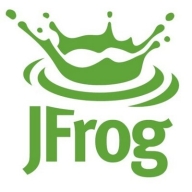

GitLab and JFrog DevOps Cloud Platform are competitors in the DevOps landscape. GitLab often has the upper hand due to its comprehensive CI/CD and cost-effectiveness, while JFrog attracts attention for its superior artifact management.
Features: GitLab is recognized for its built-in CI/CD pipeline, project management tools, and collaboration features that enhance the efficiency of DevOps processes. JFrog DevOps Cloud Platform is notable for its artifact management capabilities, binary lifecycle management, and robust integration with multiple development tools. The distinction lies in GitLab's broader functionality compared to JFrog's specialized approach in managing artifacts and binaries.
Ease of Deployment and Customer Service: GitLab stands out with its user-friendly deployment, offering clear documentation and effective support that smoothens the deployment process. JFrog DevOps Cloud Platform, on the other hand, requires more technical expertise for full integration, making its deployment potentially more challenging. Nevertheless, it is supported by detailed and complex documentation.
Pricing and ROI: GitLab is considered more affordable with attractive ROI through its integrated DevOps tools which are generally economical. JFrog DevOps Cloud Platform, while having higher initial costs, brings significant value with its advanced artifact management, which can be advantageous for large environments that benefit from its extensive capabilities.


GitLab is a complete DevOps platform that enables teams to collaborate and deliver software faster.
It provides a single application for the entire DevOps lifecycle, from planning and development to testing, deployment, and monitoring.
With GitLab, teams can streamline their workflows, automate processes, and improve productivity.
The JFrog DevOps Cloud Platform optimizes software development life cycles through robust artifact management, CI/CD automation, and strong version control. Notable for its security features, it supports seamless software version maintenance and vulnerability scanning. Praised for enhancing organizational efficiency, it ensures faster, secure deliveries, improving collaboration within teams.
We monitor all DevSecOps reviews to prevent fraudulent reviews and keep review quality high. We do not post reviews by company employees or direct competitors. We validate each review for authenticity via cross-reference with LinkedIn, and personal follow-up with the reviewer when necessary.